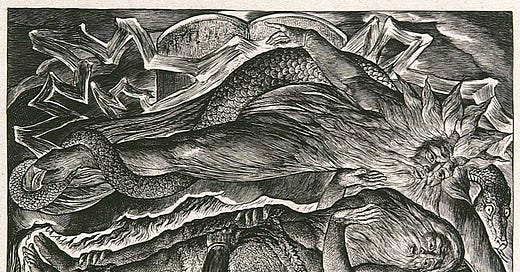This is the second essay in a series on The Caducean Phenomenon.
According to Christians, "all glory goes to God," and in the overdetermined, never-in-doubt teleology, Christ's victory is the final outcome. Yet where would Christians be without the devil? He is the oppositional pole to Jesus and a figure who is so powerful, Christian fear, he just might win. Satan, in our analysis, emerges as a caducean enemy to Christ in the Gospels, and Yahweh's "right-hand man" in the Hebrew Bible. The famous Book of Job is the foundational example. Usually dated to the second or third century B.C., and containing monologues, prose narrative, and poetry, Job is a touchstone for "justifying God's ways to men" or, as we will see, not justifying them at all.
Job himself hails from Uz, as mentioned, a place associated with Edom, among lands foreign to Israel.1 He is devoted to Yahweh, upright, and blameless, and enjoying the fruits and happiness of his god's blessing. Job is, on a base level, an archetypal Aryan. In the narrative, Satan—literally the "Adversary" or "Accuser" (הַשָּׂטָן)—casually strolls into Yahweh's Court of Angels, after having wandered the Earth, to and fro. He challenges Yahweh to test Job's devotion. After all, how could one really know if Job were loyal, having been blessed with thousands of camels and oxen. One could only know for sure if Job were impoverished and made miserable. Yahweh accepts the gambit, and what follows is an almost satirical series of calamities visited upon poor Job, the news delivered by messenger (13-22). Job's livestock gets ravaged by raiders, some even consumed by the "fire of God." Finally, Job learns that all his sons and daughters are dead after a brutal wind blew down their house. Despite it all, Job responds with stoicism. He unclothes, shaves his head, and declares to Yahweh:
Naked I came from my mother’s womb,
And naked shall I return there.
The Lord gave, and the Lord has taken away;
Blessed be the name of the Lord. (20-21)
Job, who will be subjected to even more torture, becomes the paradigm of the Gentile devoted to Yahweh. Job's name means “persecuted” or “hated,” this despite the fact that he is unquestionably loyal and righteous. Yahweh's response to Job's plight—and his understandable demand for answers and justifications—is grandiose and unfeeling: "Where wast thou when I laid the foundations of the earth?" (Job 38:4). In other words, "Who do you think you are?"
What is relevant for our purposes is the caducean quality of the character of Satan, the Adversary. In this foundational text, we do not find the Miltonian figure who revolts against God and prefers to "reign in Hell than serve in Heaven," nor is Satan the familiar stereotype of the seducer, leading unsuspecting Christians into Hell through sex, drugs, and rock-and-roll. The Adversary is, to the contrary, a thoroughly Yahwehian figure. Comfortable and welcome in Yahweh's Court, he is determined to probe the sincerity of those devoted to the Lord. *Via-à-vis* Christ, who shares Satan's ultimate goal, the Prince of Darkness is the very essence of "controlled opposition."
"The Wall Scroll, a document from the Dead Sea Scrolls, suggests that Uz is somewhere beyond the Euphrates, possibly near Aram. At column II, verse 111, the scroll mentions, 'They shall fight against the rest of the sons of Aramea: Uz, Hul, Togar, and the Mesha, who are beyond the Euphrates.'" From Stephen J. Vicchio, The Book of Job: A History of Interpretation and Commentary (Eugene: Wipf and Stock, 2020).




